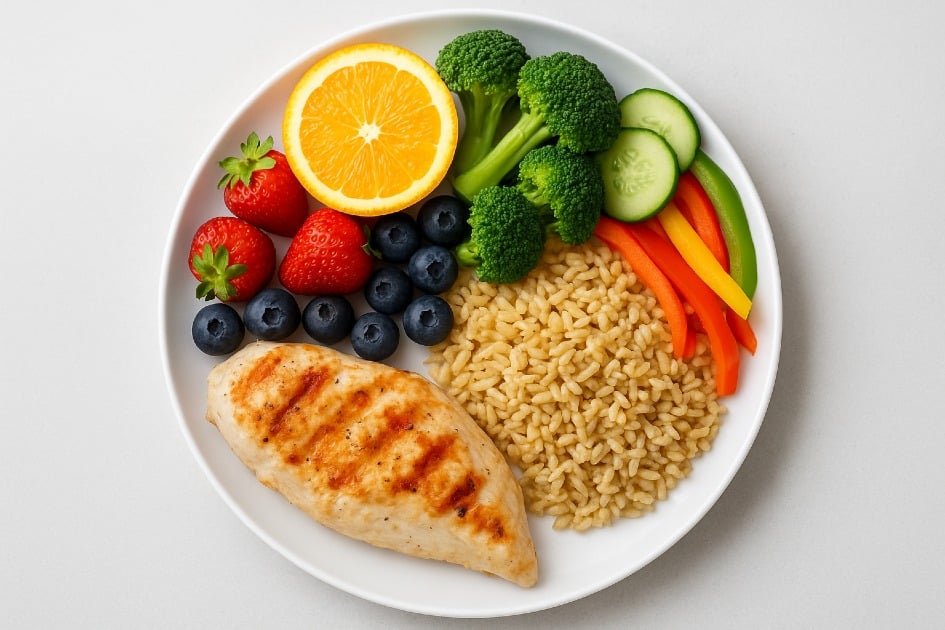Have you ever wondered why doctors so often harp on about a balanced diet, even when all the flashy diet fads promise quick fixes?
It is not about cutting out foods you love or tracking every bite. It is finding an effortless way of eating that keeps your energy steady, strengthens your immune system, and supports your brain without feeling hard or strict.
Harvard Health recommends consuming half of your plate with fruits and vegetables, quarter with whole grains, and the other quarter with lean protein at most meals.
This guide aims on the significance of a balanced diet, vital nutrients, the prevention of chronic diseases, and practical, enjoyable strategies for integrating this approach into daily life.
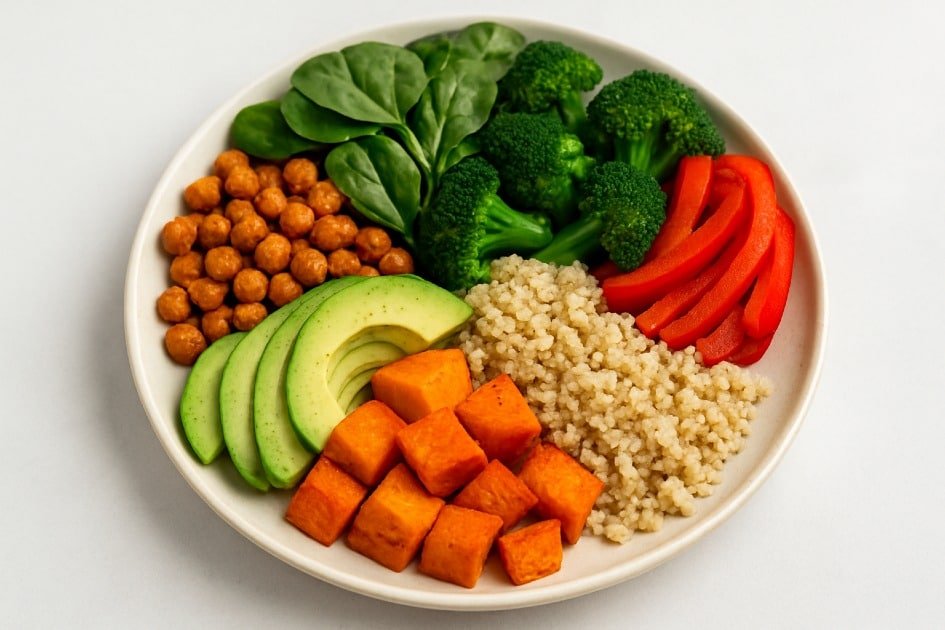
What a Balanced Diet Really Means
Conflicting nutrition advice can feel confusing. A balanced diet does not follow strict rules. It empowers your body safely and keeps you going fuller.
Debunking the “Perfect Diet” Myth
Chasing a perfect diet often causes guilt and stress. Eat a balanced mix of fresh vegetables, good proteins, and enjoy treats now and then.
I felt guilty eating pizza every Friday night. Later, I realized that enjoying it slowly with a side salad did not hurt my health. My guilt came from thinking I had to be perfect, not the pizza itself.
See foods as part of a spectrum and use meal prep containers to control portions without tracking every bite.
Understanding Food Groups as Building Blocks
Fad diets can make you miss important nutrients like carbs, fats, protein, and hormones, which your body needs for energy, muscle repair, and staying healthy.
Choose food from all groups in the right amounts to build a strong, healthy body.:
- Proteins for tissue repair and satiety
- Carbohydrates for energy and brain power
- Healthy fats for cellular health
- Fruits and vegetables for vitamins, minerals, and antioxidants
When I started eating whole grains again after trying keto, my energy shot up. I felt stronger in my workouts and no longer crashed in the afternoon.
Harvard T.H. Chan School of Public Health says eat plenty of vegetables, fruits, whole grains, protein, and healthy plant oils, and drink water to keep your diet balanced.
The 80/20 Rule: Flexibility Without Guilt
Strict dieting causes a cycle of cutting back and then overeating. The 80/20 method works better by letting you eat healthy foods most of the time while still enjoying treats.
I use this rule at family parties. I enjoy a piece of birthday cake (20%) and balance it with a veggie-filled dinner (80%). This simple shift stopped the guilt I used to feel after holidays.
A digital food scale helps you find balance without stressing over every calorie.
Why Balance Beats Trends Every Time
Trendy diets give fast results but rarely keep you healthy in the long run.
A balanced diet fuels the body with variety, keeps energy steady, lifts mood, and protects against disease, making it the base of good health.
I once tried a strict juice cleanse. I lost a little weight, but I felt weak, irritable, and always hungry. When I went back to balanced meals with protein, grains, and vegetables, I finally felt steady and healthy.
To keep balance simple, try portion control plates—a tool trusted by dietitians.
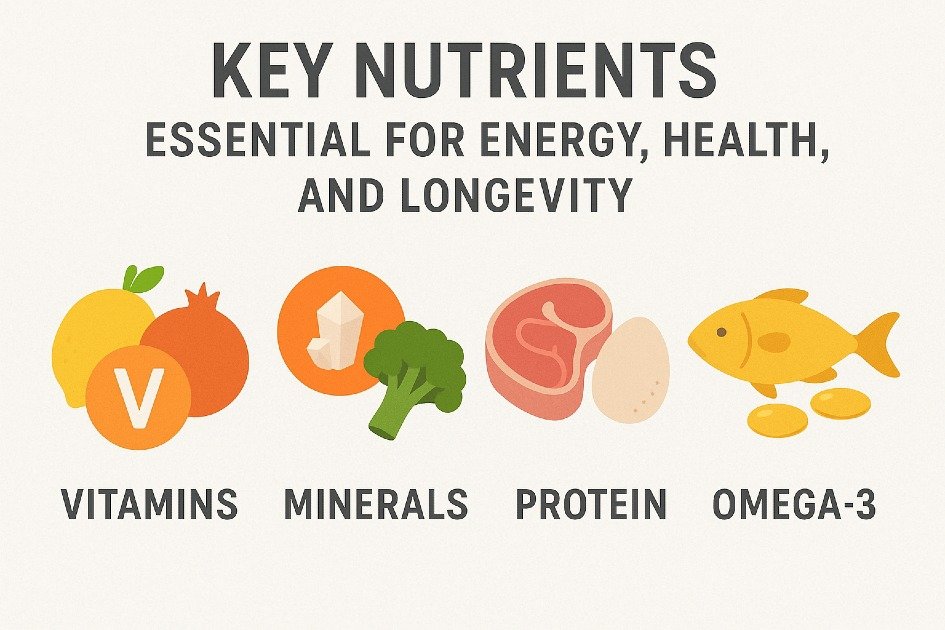
The Doctor’s Plate: Key Nutrients You Cannot Ignore
Energy and vitality do not come from cutting sugar or skipping fried food; they come from giving your body the nutrients it needs every day for balance and good health.
Protein Power: More Than Just Muscles
Protein helps your body fix cells, fight sickness, and keep your brain sharp. It is useful for all people, not only for athletes or bodybuilders.
Add protein to every meal with foods like chicken, fish, beans, eggs, lentils, or plant-based protein powders.
Choose a protein smoothie with Greek yogurt and spinach instead of a mid-morning pastry to keep your energy steady all day.
Keep protein bars in your bag to stay fueled when your day gets busy. They keep eating healthy quickly and easily.
Carbohydrates: The Energy Engine
Fad diets often blame carbs, but cutting them out can leave you tired, cranky, and unable to focus.
Choose slow-digesting carbs like brown rice, oats, quinoa, and sweet potatoes to keep your energy steady.
Boost your energy by eating oatmeal with nuts. Try quick cooking whole grain mixes and add vegetables for an easy, healthy meal.
Fats: The Good, The Bad, and The Misunderstood
Many people fear fats, thinking they cause weight gain or heart problems. But healthy fats fuel your brain, balance hormones, and keep your skin glowing.
Consume monounsaturated and polyunsaturated fats from avocados, nuts, seeds, and fatty fish, and add flaxseed oil to your morning smoothie for improved focus and hunger relief.
Use extra-virgin olive oil instead of butter when cooking. It tastes great and protects your heart. Harvard Health Publishing says good fats give you energy, help your organs, support cell growth, control cholesterol, keep blood pressure steady, and help your body absorb nutrients.
Micronutrients: Small but Mighty Essentials
Not getting enough vitamins and minerals, like magnesium and vitamin D, can make you tired, disrupt your sleep, and make you sick.
Processed foods in today’s diet often miss key nutrients. Eat a colorful mix of vegetables and fruits, like spinach and bell peppers, on half your plate to start your day with a healthy, nutrient-rich breakfast.
When you cannot get fresh fruits and veggies, taking a good multivitamin supplement helps fill in the missing nutrients.
Why Balance Matters More Than Perfection
Eating a balanced diet gives your body the protein, good fats, carbs, and vitamins it needs to work at its best.
You do not need strict food rules. Eat a mix of foods regularly, in moderate amounts, and focus on getting the right nutrients. This makes eating less stressful and more enjoyable.
Plan your meals and make smart swaps to enjoy foods that satisfy your cravings while keeping your body healthy.
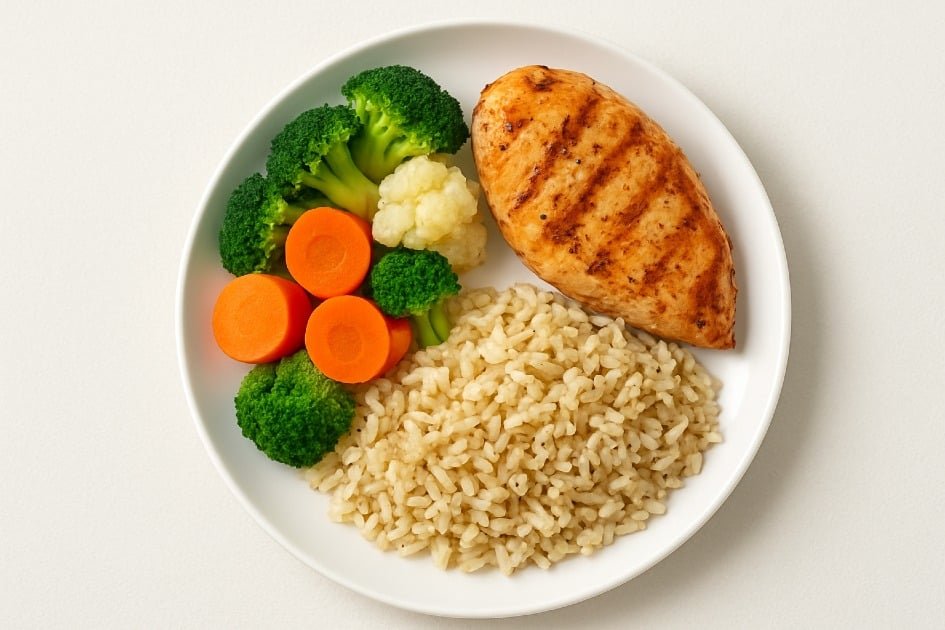
Secrets to Portion Control Without Counting Every Bite
Healthy living means creating natural habits that help you eat the right portions instead of tracking every single meal.
Mastering portion control helps you eat a balanced diet without feeling limited or stressed.
The Problem with Counting Every Bite
Measuring rice or logging every meal with apps can feel robotic, which often leads to burnout and makes it harder to stay consistent long term.
Use clear visual cues your body can recognize, so the strategies feel natural and easy to keep.
The “Hand Method” Doctors Recommend
Your hands fit your body perfectly, and you can use them as measuring tools.
- Use your palm to measure protein—like chicken, fish, or beans—for one meal.
- Use your fist to measure one serving of carbs like rice, quinoa, or sweet potato.
- Your thumb shows the right amount of healthy fat, like olive oil, nut butter, or avocado.
I used this trick on my busiest nursing shifts when I had no time for apps or calculators. With just a glance at my hand, I could tell if my portions were right. This simple habit helped me stay on track with my balanced diet, even on tough days.
The Morning Sidekick Journal helps you build strong habits every day—no calorie counting needed.
Visual Cues That Keep Portions in Check
Big plates trick your brain. Small portions look even smaller, so you end up eating more.
Use smaller plates instead of big ones. Your meal looks full, and your brain feels satisfied faster.
At family gatherings, I swapped my own dishes. It changed everything—I felt full without feeling stuffed.
Portion-control plates, like Precise Portions Dinnerware, show you the right food balance at a glance.
Mindful Eating: Why Eating Slowing Matters
Life moves fast, and we often eat just as quickly. Eating too fast can make you miss your body’s signals, causing you to eat too much.
Stop between bites. Set your fork down, drink some water, or chat a little. This lets your body know when you have had enough to eat.
While having lunch with my colleagues, I noticed something important. Eating slowly helped my digestion and gave me more energy for the rest of the day. Portion control over a balanced diet does not mean eating less, it means eating smarter.
Harvard Health encourages people to eat mindfully. Pay attention to how your food tastes, smells, and feels, and listen to your body when it says you are hungry or full.
Portion Control Without Deprivation
Portion control does not mean skipping your favorite foods. Eating in moderation keeps you balanced and satisfied.
Choose small portions of chocolate or pasta to enjoy treats without overeating.
I enjoy pizza nights and ice cream socials while sticking to my balanced diet. Follow a plan, stay steady, and enjoy freedom without guilt.
Smart snack boxes help you control treats, so you do not eat too much when cravings hit.
Making Portion Control Second Nature
Portion control means eating the right amount, savoring your food, and keeping a balanced diet for long-term health. Focus on choosing smart foods, not just eating less.
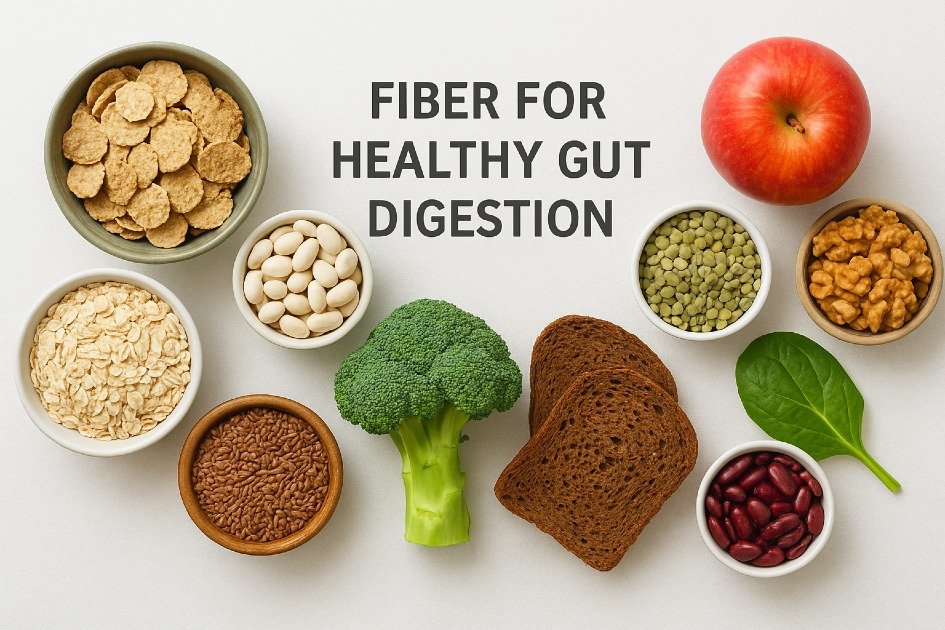
Fiber: The Unsung Hero of a Healthy Gut
Fiber keeps your digestive system strong, but many people forget to include it in their meals.
Studies show most adults eat only half of the daily recommended amount, which can slow digestion, cause weight gain, or make blood sugar spike.
Let us discover why fiber is a hidden hero for your gut and how you can add it to your meals every day.
Why Fiber Deserves More Attention
Fiber keeps your gut healthy and your energy steady. It boosts your digestion, lowers cholesterol, controls blood sugar, and keeps you full longer.
Many people eat processed foods that have little fiber. Choosing whole foods like whole-grain bread or steel-cut oats helps keep your diet healthy.
Two Types of Fiber, Two Different Benefits
Fiber comes in two types: soluble and insoluble. Each type helps your body in separate ways, and both are important.
- Soluble fiber mixes with water in your stomach and forms a soft gel. It slows digestion and keeps your blood sugar steady. You can find it in oats, apples, and beans.
- Insoluble fiber sweeps your intestines clean, moving waste along. You can gain it by eating vegetables, nuts, and whole grains.
Eat fiber-rich foods from both types, such as putting chia seeds in your smoothie and roasting broccoli for dinner, to keep your diet balanced.
Fiber and the Gut-Brain Connection
Fiber keeps your digestion running smoothly and nourishes the healthy bacteria in your gut. These bacteria make short-chain fatty acids that boost your mood, immunity, and brain health.
Low-fiber diets can hurt your gut bacteria. Boost them by eating prebiotic fibers such as garlic, onions, and asparagus, and include probiotics from yogurt or supplements to support your body and brain.
Ways to Sneak Fiber into Every Meal
Boosting your fiber intake is easy. A few smart swaps and ideas can do the trick.
- Have a bowl of overnight oats with fresh berries on top in the morning.
- Chop vegetables in advance so you can grab a healthy snack anytime.
- Trade your chips for a bowl of air-popped popcorn.
- Sprinkle ground flaxseed or psyllium husk into your smoothie to boost fiber and nutrients.
Boost your fiber by adding herbs and spices, roasting vegetables, and trying dishes from around the world like lentil dal or Mediterranean chickpea salad. Focus on enjoying every bite for its flavor.
The Gentle Reminder
Fiber works best when you drink enough water. Adding fiber too fast without enough fluids can lead to bloating or constipation.
Eat a balanced diet with plenty of fiber and fluids. Include water-rich foods like cucumbers, oranges, and watermelon to stay hydrated.
My Personal Experience with Fiber
I once ignored fiber for too long. I thought I ate healthy but often skipped vegetables when I was busy. Soon, I felt tired all the time and my digestion got messy.
Once I started eating a balanced diet with fiber at every meal—like brown rice, leafy greens, and beans—I felt more energetic and clear-headed. It did not happen instantly, but in a few weeks, my body felt lighter and worked better.
Track how you feel each day—energy, mood, and digestion—while slowly adding more fiber to your diet. This helps you keep your fiber intake steady.
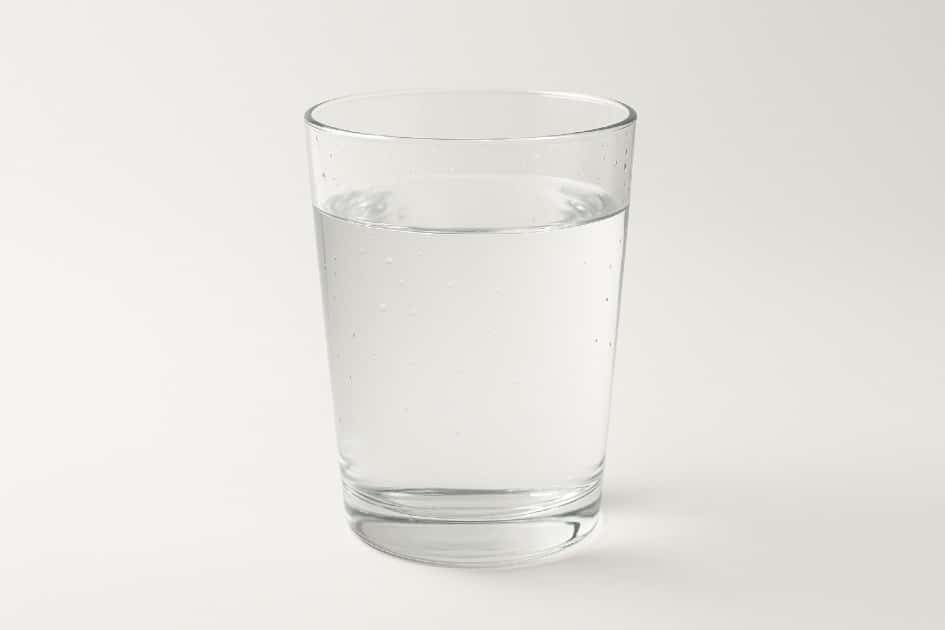
Hydration Hacks Doctors Swear By
Not drinking enough water makes you feel tired, slow, and hungry for snacks.
Simple tricks help you drink water every day, making it an important part of a healthy diet.
Why Water Is Your Body’s Daily Reset
Dehydration affects your body in many ways. Low water intake can make you sleepy, give you headaches, and change your mood.
Eating a balanced diet helps your body absorb nutrients and keeps blood flowing well. Your meals will not help you as much without them.
I drink water as early as I rise from bed before reaching for coffee. Drinking water with your meals helps your body get the most from a balanced diet.
Signs You Are Not Drinking Enough
Many people ignore dehydration, but it can cause dry skin, dark urine, and trouble focusing. Even with a healthy diet, your body needs water to stay energized.
Check your urine color and notice when your energy drops to spot dehydration early. Drink water before you have a snack. Often, your body feels hungry when it is thirsty.
Flavor Your Water Naturally
Infuse your water with cucumber, lemon, or berries. Enjoy the light taste while getting healthy antioxidants.
Mint water feels like a spa treat, and fruit-infuser bottles let you drink it on the go without adding extra sugar to your diet.
Hydration Hacks for Busy Lifestyles
Rushing through work and chasing deadlines often makes people skip drinking water. Pair water breaks with daily tasks to stay hydrated and keep your focus sharp.
I keep a reusable water bottle on my desk. It helps me remember to drink. My hydration tracker sends alerts until drinking enough water becomes a habit.
Eating Your Water Through a Balanced Diet
You stay hydrated not only by drinking water. Eating foods like watermelon, cucumbers, and leafy greens adds water to your body too.
When I swapped chips for cucumber slices, I stayed full and felt more energized. Eating food like this keeps you hydrated and makes your diet healthier without much effort.
Small Shifts, Big Results
Staying hydrated gives you more energy, improves digestion, and brightens your skin. Easy daily habits, such as flavored water or water-rich foods, build long-lasting vitality.
Begin with a simple water habit today and slowly make hydration a daily part of your routine.
Recap: Balance Is Simpler Than You Think
Eating a balanced diet is not about being perfect. Focus on small, consistent changes and simple swaps to make your meals healthier every day.
Food can fuel your body and bring joy. Choose colorful veggies, lean protein, whole grains, and healthy fats, but save room for a small treat now and then.
A balanced diet is not just a list to follow—it is a way of living that builds lasting health. When you drink enough water, eat the right portions, and choose different foods, you give your body the fuel it needs to stay strong and active.
Small steps lead to big results. A balanced diet fits into your life instead of making you change your whole routine.
Morning Sidekick Journal helps you track habits, while the HydroMATE half gallon water bottle keeps you on top of your hydration.
Harvard Health gives a trusted guide on nutrition basics, matching what most doctors recommend and steering readers away from false trends.
A balanced diet gives your body steady energy, builds strength, and helps you live longer in a simple, flexible way.
Stop stressing about being perfect. Keep balance by making small, smart choices every day.
Frequently Asked Questions
Does eating a balanced diet mean you have to eat less?
A balanced diet gives your body the nutrients it needs by including all food groups in the right amounts. It is not about cutting calories, it is about eating a variety of healthy, good-quality foods.
Eating nutrient-rich meals helps your body feel full and satisfied. It also lowers cravings without making you feel deprived.
Can I enjoy my favorite snacks and still eat balanced?
Eating mostly nutrient-rich whole foods—about 80% of your meals—and saving 20% for treats helps you stay energized and enjoy healthy eating without feeling burned out.
Pick treats mindfully, like small pieces of organic dark chocolate, to enjoy food slowly and stay healthy. Eating a slice of cake or pizza will not hurt your health.
When will I start seeing results from a balanced diet? diet?
Eating a balanced diet gives you more energy, helps your digestion, and can make you feel happier in just a few weeks. Over time, it also lowers the risk of heart disease and helps keep cholesterol in check.
Stick with it every day; your effort grows into lasting results.
What small steps can I take when I feel overwhelmed?
Build a balanced diet by making small, easy changes: drink water or herbal tea instead of sugary drinks, add more vegetables to your dinner, and choose whole grains over refined grains.
Load half your plate with colorful veggies, add a quarter with lean protein, and fill the last quarter with whole grains.
Can supplements take the place of a balanced diet?
Supplements can fill nutrient gaps, but they cannot replace real food. Eating a balanced diet gives your body fiber, enzymes, and phytonutrients that pills cannot provide.
Use supplements as backup, not the main plan. Multivitamins can help, but real food should come first.

